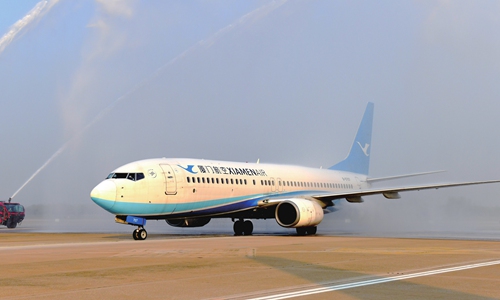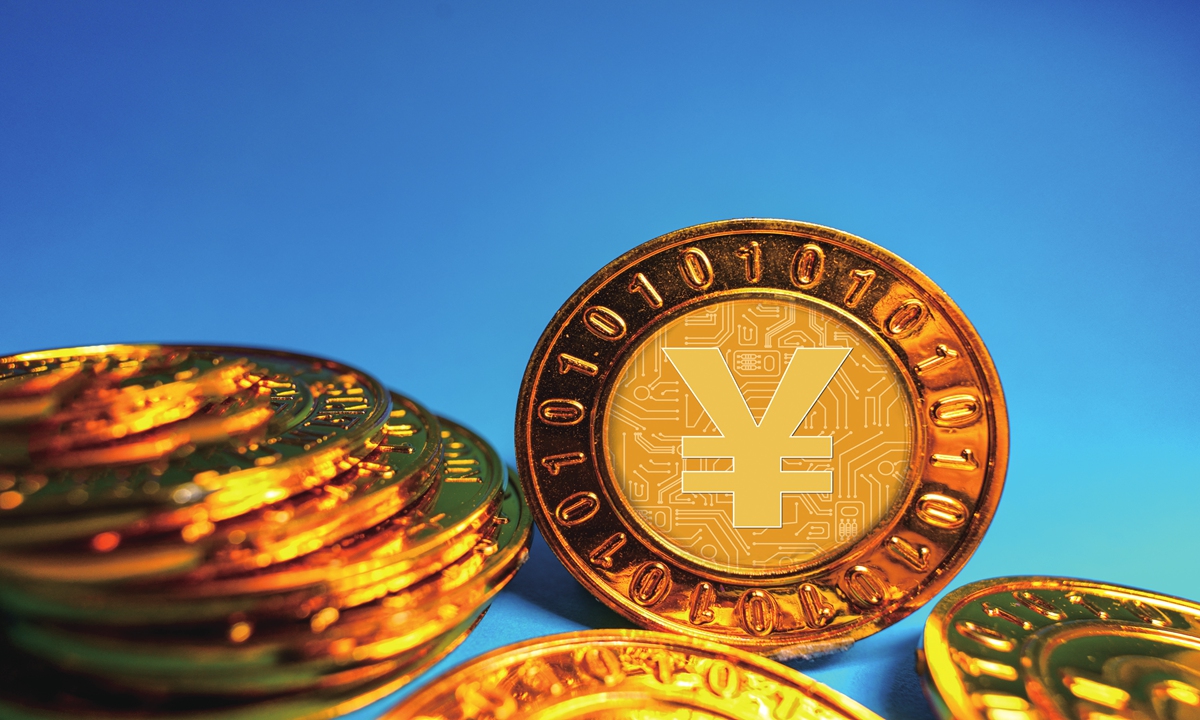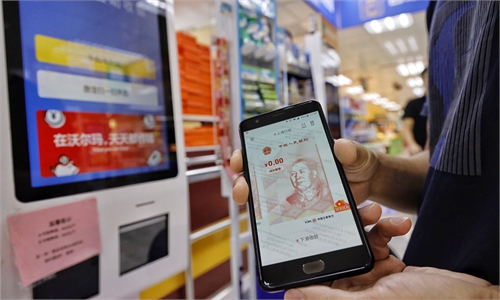From terminal to take off, China’s digital yuan changes payment methods across aviation sector
New payment method applied across aviation sector in China

A Xiamen Airlines passenger plane lands at Wuhan Tianhe International Airport on Wednesday. It is the city's first inbound flight after the 76-day lockdown ended. Photo: Xinhua
Chinese digital currency has begun its integration with the aviation industry in recent months, including tickets and airports, with more scenarios expected to be added as the Beijing 2022 Winter Olympics approaches.
Xiamen Airlines said in a note sent to the Global Times on Wednesday that it launched the first ticket paid by digital yuan on Tuesday.
At present, travelers who reside in digital yuan pilot cities can apply at the Bank of China, Agricultural Bank of China, and Industrial and Commercial Bank of China to access digital yuan services. Passengers purchasing air tickets on Xiamen Airlines' domestic official website can also use digital yuan to make quick payments.
Digital yuan is particularly well suited for in-flight payment situations in which in-cabin WiFi is not provided or available, meeting the needs of passengers paying for goods or services during flights, Xiamen Airlines said in the note.
Xiamen Airlines is the latest example of the private sector embracing digital currency, with competitor Spring Airlines launching a digital yuan trial earlier in 2021.
In April, Spring Airlines had an order of 560 yuan ($87) paid with digital yuan for a flight ticket from Shanghai to Shenzhen, marking the start of digital currency payment in China's civil aviation sector.

Photo: VCG
The ticket was purchased by a Shenzhen resident surnamed Shui during Spring Airlines' digital currency trial, the first air ticket bought using digital yuan.
Zhang Wu'an, a spokesperson from Spring Airlines told the Global Times that digital yuan can be used to purchase air tickets. It can be applied in the terminal at the end of the month, and the carrier plans to expand its use to in-flight sales next year.
Airlines are not alone. Airports are also accepting the new way to pay.
In October, Beijing Capital International Airport launched a pilot digital yuan service, passengers can use digital currency at stores in the airport, in addition to paying for airport parking.
The airport said it would realize the digital yuan collection function covering more than 110 commercial outlets and all parking sites in the facility in September 2021.
The trial for digital yuan is in full swing across China. Since late 2019, the People's Bank of China (PBC) has launched pilot experiments for using the digital yuan at dozens of places including cities like Shenzhen and Suzhou and Xiongan New Area.
The digital yuan will also be used during the Beijing 2022 Winter Olympics.
Yi Gang, the governor of the PBC said earlier that the development of legal digital currency is conducive to efficiently satisfying the public's demand for legal currency, improving the convenience, security and anti-counterfeiting level of retail payments, while also boosting the accelerated development of China's digital economy.
The upcoming Winter Olympics is viewed as an important driving force for the business expansion for digital currency.
Officials said that it will fully support the construction of the Winter Olympics payment environment and accelerate the promotion of pilot work.
Fan Yifei, a deputy governor of the PBC, said in July that the Beijing Winter Olympics in 2022 would be a key trial area.
At present, application scenarios for digital yuan are continuously expanding, covering public utilities, catering services, transportation, shopping and government affairs. Industry demand may enter a period of acceleration.
Currently, 1.55 million merchants support digital yuan wallets.
Digital yuan has significant application potential, which has attracted the involvement of many financial institutions, including traditional banks and third-party payment institutions.
Mu Changchun, director of the Digital Currency Research Institute of the PBC, outlined that as of October 22, 140 million digital yuan personal wallets and 10 million corporate wallets have been opened. China's digital yuan transactions reached 62 billion yuan as of October 22 this year.
Digital yuan is an important platform for future currency development projects. Actively developing digital yuan business can increase revenue growth and keep up the pace of innovation in payment methods. Its real value for businesses will become more apparent in line with the growth in its popularity, Zhang from Spring Airlines told the Global Times.


